Xi tells Obama disputes should avoid misunderstandings
Updated: 2016-04-01 07:48
By AN BAIJIE in Washington(China Daily USA)
|
||||||||
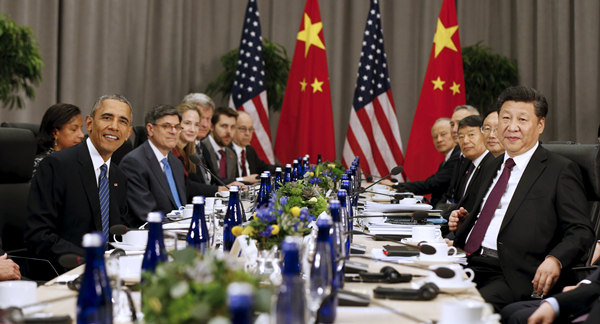 |
|
US President Barack Obama and President Xi Jinping take part in a bilateral meeting on the sidelines of the Nuclear Security Summit on Thursday in Washington. MANDEL NGAN / AFP |
China and the United States should handle unresolved disputes in a constructive manner to avoid misunderstandings and escalation in conflicts, President Xi Jinping told US President Barack Obama on Thursday.
China will firmly safeguard its sovereignty and relevant rights over the South China Sea, and it will not accept any activities in the excuse of free navigation that could harm national sovereignty and interests, Xi said.
"I would like to reiterate to work together with the US side to establish a new-type relationship of big powers, achieve the goal of no conflicts or confrontations, respect with each other, cooperate for win-win results, which is the priority of China's foreign policy," he said.
The Chinese president made the remarks while meeting with Obama on Thursday afternoon on the sidelines of the fourth Nuclear Security Summit (NSS).
The 90-minute meeting was the only bilateral meeting that Obama has arranged during the summit.
Xi acknowledged that there are disputes and different views between China and the US in some areas, and both sides should respect each other's major concerns and seek solutions through dialogue.
"I expect to enhance communications with President Obama to focus on cooperation, manage disputes, boost mutual trust and push forward the China-US relationship to continue to develop in a healthy and stable direction," he said.
China would like to enhance communications with the US on regional and global issues such as the nuclear issue of the Korean peninsula, Xi said.
As the world's biggest developing country and developed nation, China and the US have important responsibilities in maintaining world peace and safeguarding stability, and there is large room for the two countries to cooperate, Xi said.
Xi mentioned that the bilateral trade, two-way investment and personnel exchanges between China and the US have reached the highest level during the past few years.
The two countries have carried out effective communications on issues including Iranian nuclear, Syria, Afghanistan, peacekeeping, development and health, showing that there is great potential for the establishment of a new-type big power relationship between China and US, Xi said.
The global economy is experiencing a sluggish period, and all the countries around the world should not stimulate export by currency depreciation, he added.
China and the US should improve the mechanism for boosting military mutual trust, and the two countries should make the issue of cyber security an area for China-US cooperation, Xi said.
The Chinese president also reiterated China's stance on Taiwan, and he called on the US to uphold the One-China policy and maintain the peaceful development of Cross-Straits ties.
Obama expressed concerns over issues including cyber security, human rights, maritime and intellectual property protection. He said he appreciated that Xi has held candid conversations in a constructive manner with him on these disputes.
Obama also expressed wishes for a successful G20 summit to be held in September in Hangzhou, East China's Zhejiang province.
In a press briefing after the bilateral talk, China's Assistant Foreign Minister Zheng Zeguang described the meeting as "positive, constructive and fruitful".
Ted Carpenter, senior fellow of defense and foreign policy at Cato Institute, said there need to be serious discussions about developing some "rules of the road" in the South China Sea. "Only preliminary steps can be taken now, but the current trend toward a dangerously confrontational stance by both countries can be halted and even reversed," he said.
Xi and Obama last met in Washington in September during Xi's state visit to the US. They then met on Nov 30 in Paris at the climate conference. The two presidents also had three phone calls since then. And they also are expected to meet on the margins of the G20 summit in China in September.
China replaced Canada last year as US' top trade partner. The two largest economies have greatly expanded their cooperation in the last few years, such as in military-to-military exchanges, non-proliferation leading to the P5+1 Iran nuclear deal and in Afghanistan in the training of young diplomats.
Chen Weihua in Washington contributed to this story.
- Cypriot court remands in custody man suspected of hijacking EgyptAir flight
- Govt eyes luxury tourists amid concerns over safety
- Sleep tight and don't let sharks bite at Paris aquarium
- Aung San Suu Kyi appointed as Myanmar's new foreign minister
- Hollande promises to tighten Euro 2016 security
- US officials applaud China for nuclear cooperation
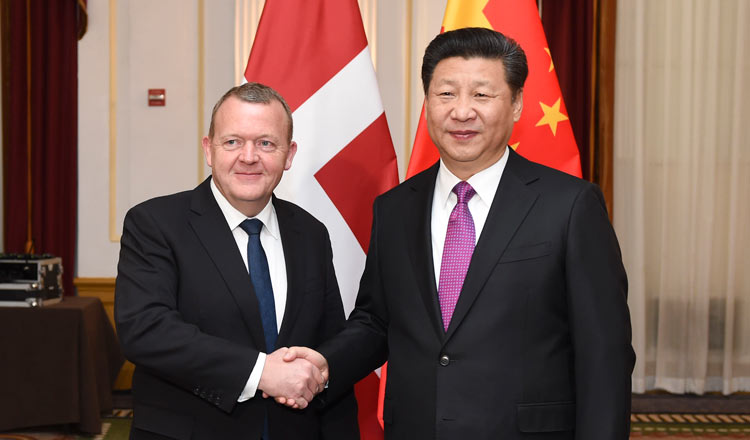
 Xi calls for bigger progress in China-Denmark ties
Xi calls for bigger progress in China-Denmark ties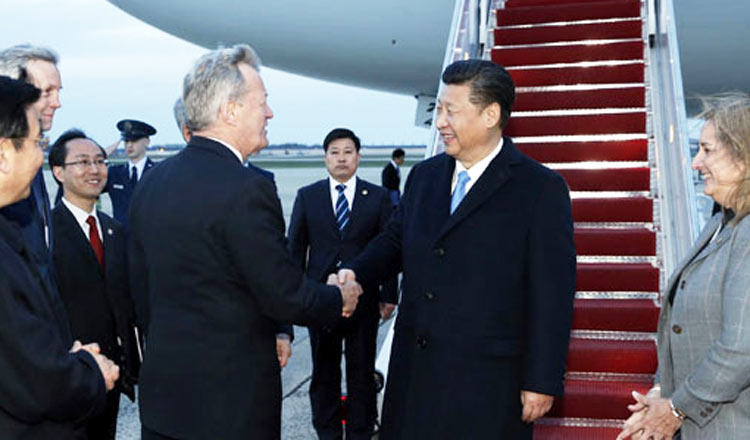
 Chinese president arrives in Washington for Nuclear Security Summit
Chinese president arrives in Washington for Nuclear Security Summit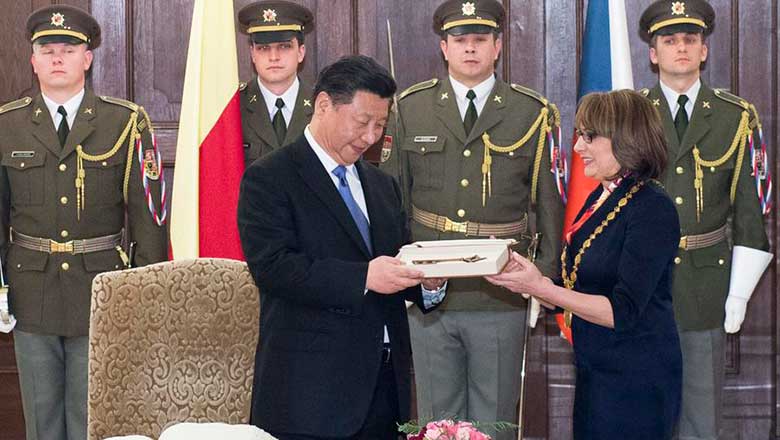
 President Xi presented with 'key to Prague'
President Xi presented with 'key to Prague'
 China move into the final stage of Asia qualifiers after 15 years
China move into the final stage of Asia qualifiers after 15 years
 Grief, anger engulf Taiwan as suspected killer of girl arrested
Grief, anger engulf Taiwan as suspected killer of girl arrested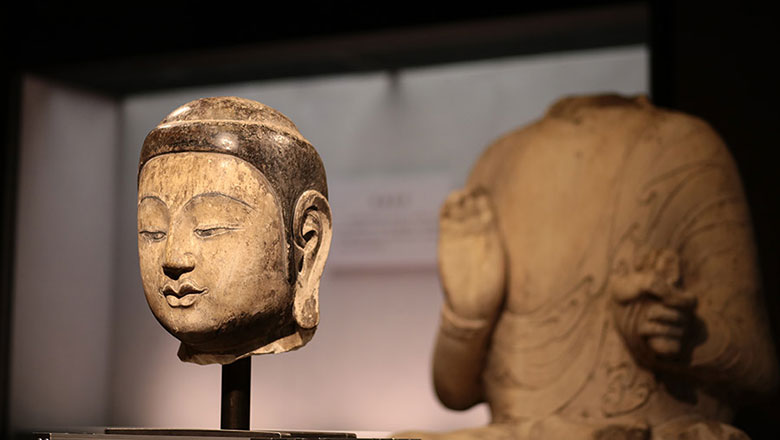
 Stolen Buddha statue head arrives in Hebei museum
Stolen Buddha statue head arrives in Hebei museum
 Top 10 best-selling beers in the world
Top 10 best-selling beers in the world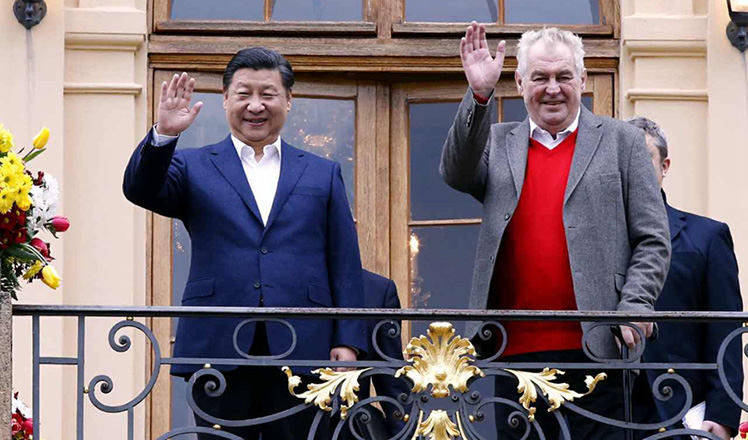
 Czech President Milos Zeman hosts Xi at private residence
Czech President Milos Zeman hosts Xi at private residence
Most Viewed
Editor's Picks

|

|

|

|

|

|
Today's Top News
Marriott unlikely to top Anbang offer for Starwood: Observers
Chinese biopharma debuts on Nasdaq
What ends Jeb Bush's White House hopes
Investigation for Nicolas's campaign
Will US-ASEAN meeting be good for region?
Accentuate the positive in Sino-US relations
Dangerous games on peninsula will have no winner
National Art Museum showing 400 puppets in new exhibition
US Weekly

|

|








